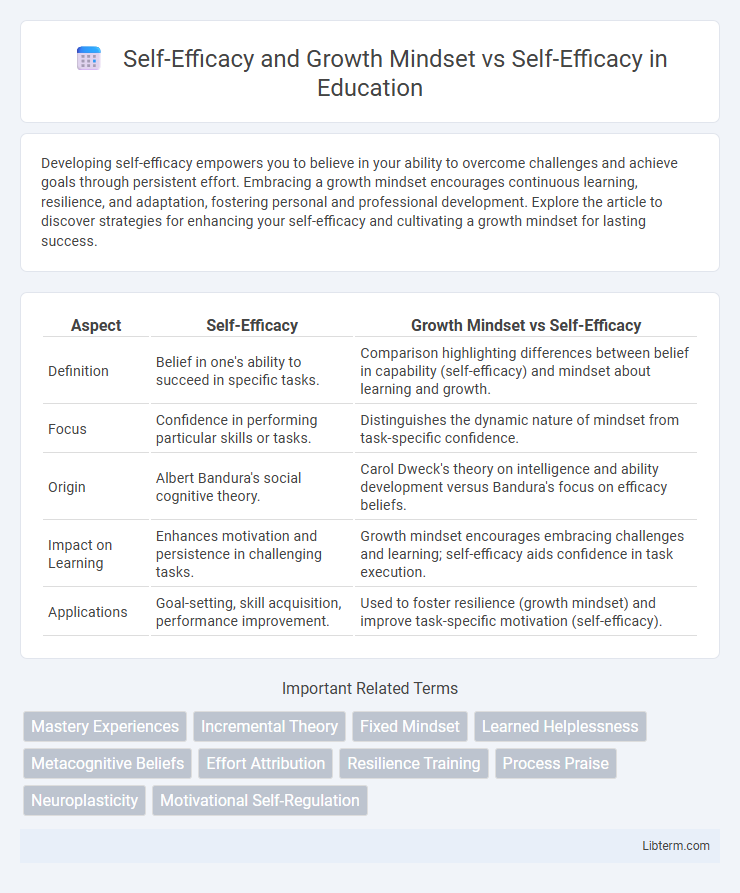Developing self-efficacy empowers you to believe in your ability to overcome challenges and achieve goals through persistent effort. Embracing a growth mindset encourages continuous learning, resilience, and adaptation, fostering personal and professional development. Explore the article to discover strategies for enhancing your self-efficacy and cultivating a growth mindset for lasting success.
Table of Comparison
| Aspect | Self-Efficacy | Growth Mindset vs Self-Efficacy |
|---|---|---|
| Definition | Belief in one's ability to succeed in specific tasks. | Comparison highlighting differences between belief in capability (self-efficacy) and mindset about learning and growth. |
| Focus | Confidence in performing particular skills or tasks. | Distinguishes the dynamic nature of mindset from task-specific confidence. |
| Origin | Albert Bandura's social cognitive theory. | Carol Dweck's theory on intelligence and ability development versus Bandura's focus on efficacy beliefs. |
| Impact on Learning | Enhances motivation and persistence in challenging tasks. | Growth mindset encourages embracing challenges and learning; self-efficacy aids confidence in task execution. |
| Applications | Goal-setting, skill acquisition, performance improvement. | Used to foster resilience (growth mindset) and improve task-specific motivation (self-efficacy). |
Understanding Self-Efficacy: Foundations and Importance
Self-efficacy, defined as an individual's belief in their capability to execute actions required to manage prospective situations, plays a crucial role in motivation and learning outcomes. It is grounded in four main sources: mastery experiences, vicarious experiences, verbal persuasion, and physiological states, each contributing to the development of confidence and resilience. Understanding self-efficacy's foundations enables educators and learners to foster environments that enhance belief in personal effectiveness, which is critical for achieving growth and adapting a growth mindset.
Exploring the Growth Mindset Concept
Exploring the growth mindset concept reveals its emphasis on believing abilities can be developed through effort, which directly enhances self-efficacy by fostering resilience and motivation. Unlike fixed self-efficacy that may rely on past achievements, growth mindset encourages viewing challenges as opportunities to improve, thereby strengthening self-belief in learning potential. Integrating growth mindset principles into self-efficacy frameworks supports sustained personal development and adaptive learning strategies.
Self-Efficacy vs Growth Mindset: Key Differences
Self-efficacy refers to an individual's belief in their ability to succeed in specific tasks or challenges, while growth mindset emphasizes the belief that abilities and intelligence can be developed over time through effort and learning. Self-efficacy is task-specific and influences motivation and perseverance, whereas growth mindset is a broader cognitive framework that shapes how people interpret success and failure. Understanding the distinction between these concepts is crucial for designing interventions that enhance motivation by targeting both confidence in capabilities and the belief in potential for growth.
How Growth Mindset Shapes Self-Efficacy
Growth mindset significantly enhances self-efficacy by fostering the belief that abilities can be developed through effort and learning, which increases motivation and resilience. This adaptive perspective encourages individuals to view challenges as opportunities for growth, thereby strengthening their confidence in mastering new skills. Research shows that individuals with a growth mindset are more likely to set higher goals and persist longer, directly boosting their perceived self-efficacy.
Evidence-Based Benefits of Self-Efficacy Alone
Self-efficacy, defined as an individual's belief in their capacity to execute behaviors necessary to produce specific performance attainments, independently predicts improved motivation, resilience, and academic success across diverse populations. Evidence-based research links high self-efficacy to increased goal-setting, persistence through challenges, and enhanced problem-solving skills in both educational and professional contexts. Meta-analyses confirm that interventions targeting self-efficacy alone result in significant improvements in task performance and psychological well-being without necessarily incorporating growth mindset components.
Synergy: Combining Self-Efficacy and Growth Mindset
Combining self-efficacy and a growth mindset creates a powerful synergy that enhances motivation and resilience in learning and performance. Self-efficacy boosts confidence in one's ability to execute tasks, while a growth mindset fosters the belief that abilities can be developed through effort and perseverance. This integration drives sustained commitment to challenges, leading to improved outcomes and continuous personal development.
Challenges in Building Self-Efficacy Without a Growth Mindset
Building self-efficacy without a growth mindset often faces challenges such as resistance to effort and setbacks, as individuals may believe their abilities are fixed rather than improvable. This fixed perspective can limit motivation, reducing persistence during difficulties and hindering skill development. Overcoming these obstacles requires shifting beliefs towards a growth mindset, which fosters resilience and adaptive learning crucial for enhancing self-efficacy.
Educational Strategies: Encouraging Both Constructs
Educational strategies that emphasize both self-efficacy and growth mindset foster student resilience and motivation by promoting belief in one's abilities and the potential for development through effort. Techniques such as goal-setting, constructive feedback, and modeling adaptive learning behaviors enhance learners' confidence while reinforcing the idea that intelligence and skills can be cultivated over time. Integrating these approaches creates a supportive environment where students persist in challenges and actively engage in their educational growth.
Self-Efficacy and Growth Mindset in the Workplace
Self-efficacy and growth mindset in the workplace foster resilience, adaptability, and continuous learning, empowering employees to tackle challenges confidently and embrace skill development. High self-efficacy enhances motivation and persistence, while a growth mindset encourages viewing failures as opportunities for improvement, leading to increased productivity and innovation. Organizations that cultivate both concepts benefit from a proactive workforce capable of navigating change and driving sustained success.
Future Directions: Integrating Self-Efficacy and Growth Mindset Research
Future directions in integrating self-efficacy and growth mindset research emphasize the development of combined intervention programs that enhance individuals' belief in their capabilities while fostering adaptive learning attitudes. Emerging studies suggest that synergizing these constructs can optimize motivation, resilience, and academic achievement across diverse populations. Advanced longitudinal and experimental designs are essential to clarify mechanisms underlying their interaction and to tailor practical applications in education and organizational settings.
Self-Efficacy and Growth Mindset Infographic

 libterm.com
libterm.com